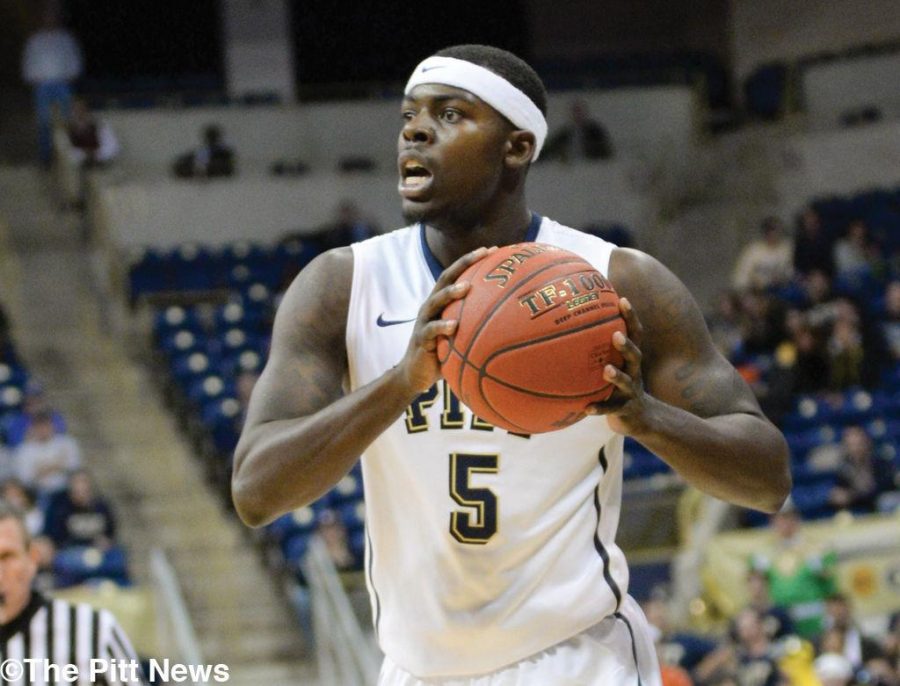Road to recovery: Durand Johnson returns to court after major injury
November 2, 2014
As the younger brother of a highly successful athlete, Durand Johnson always felt pressure to keep up with his sibling. After seeing his brother, Derrell Johnson, sign with the Miami Dolphins as an undrafted free agent from Eastern Carolina University, Durand became especially motivated.
“That just added fuel to the fire. I didn’t want to be the little brother that didn’t become successful,” Johnson said.
Before losing his sophomore basketball season to a torn ACL and meniscus in his right knee, Johnson was keeping up. He thrived as Pitt’s sixth man, averaging 8.8 points in 19.8 minutes per game.
As one of the most experienced players and top scorers on the team, Johnson will play a major role in Pitt’s success this season.
Still, Johnson, a redshirt junior wing, is coy about his importance, insisting he doesn’t feel any pressure to become a standout scorer.
“Being the leading scorer, being the leading guy, I’m not even thinking about that,” Johnson said. “I just want to play, and, being a leader, I know my team will follow me.”
If Pitt is to continue to meet head coach Jamie Dixon’s high standards of winning, it will need Johnson to carry over his success from last season. To do that, he’ll need to continue his steady improvement, which has turned him from a 3–point specialist into a complete player, looking primed for a breakout.
“He definitely has the tools to be somebody that can take over a game and have nights where he explodes for 20-plus points regularly,” Jason Smith, Johnson’s prep head coach at Brewster Academy, said.
A Baltimore native, Johnson played his senior year at Lake Clifton High School before playing a post-graduate year at Brewster Academy in Wolfeboro, N.H. Johnson was a stout perimeter defender and scorer. On most teams, Johnson would have taken on a bigger role, but on a national prep powerhouse featuring other highly ranked prospects, he stepped back.
“When Durand was here, he filled a role for us, but he certainly could have had a bigger role. But with him, it was about team, the success and winning,” Smith said.
After helping lead Brewster to a 31-3 record, Johnson chose Pitt over schools like Florida State, Maryland, Louisville, Georgetown, St. John’s, Seton Hall, Marquette and Cincinnati.
College life showed him that the jump in skill level and physical requirements is immense from high school or prep to college. Like many Pitt freshmen before him, Dixon gave Johnson a redshirt in his first season. He used that year to refine his skillset and add weight and muscle to his frame.
He also needed to utilize the year to improve his mindset during games.
“When I came in, I was more offensive-minded. All I wanted to do was shoot and jack up shots,” Johnson said.
But that isn’t Dixon’s primary focus at Pitt.
“Play defense and rebound, or you won’t play,” Dixon insisted.
“Just hearing that, I thought there’s no way I can ride the bench,” Johnson said. “I got to do whatever I got to do to get out on the court and help my team win games. I just took that and held on to it and I use it every day.”
With that mentality, he played a role off the bench in his freshman season. His improved defense and rebounding allowed him to see the floor, and his 3-point shooting kept him there. Johnson averaged 4.3 points in 11.9 minutes per game, making 38 percent of his shots behind the 3-point line. When Pitt needed a spark, he was often the one to deliver it.
Notably, he hit three 3-pointers in two games against Villanova, helping Pitt maneuver out of offensive ruts and win both games. The season helped springboard Johnson into becoming one of the better sixth men in the ACC last season. In the offseason leading up to it, Johnson focused on continuing to become a complete player.
“Being around with Coach Dixon, I just had to know that I had to mix my game up — I got to get to the rim, I got to make my teammates better, make the extra pass, do the little things that count,” Johnson said.
Finally, Johnson started to see further results for his hard work. Using his athleticism, Johnson held his own on the boards, averaging three rebounds a game. He developed a firm grasp of Pitt’s defensive tactics, switching well and playing especially effectively in zone defense, averaging one steal per game. Most surprisingly though, Johnson accumulated a solid 1.6 assist-to-turnover ratio.
“He had become a pretty good playmaker for us. His assist to turnover numbers were good,” Dixon said. “And that’s from a guy who didn’t know what that phrase meant when he first got here.”
Limiting turnovers was just part of the overall improvement Johnson showed.
“I was getting in my comfort zone out there, everything was flowing,” Johnson said.
It really started to come together for Johnson in ACC play, when he scored 17 points against Maryland and 11 points against Wake Forest.
And then, after landing awkwardly on his right leg against Wake Forest, his season was over.
“I was devastated. All I could think about was ‘could I play again? Would I play again?” Johnson said.
Read part two of Johnson’s recovery back to the court in Tuesday’s paper.








